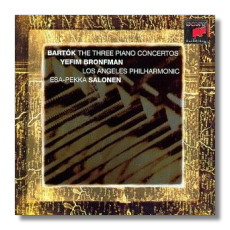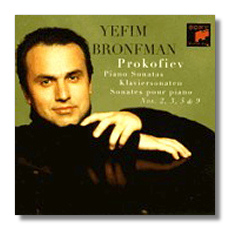
The Internet's Premier Classical Music Source
Related Links
-
Bartók Reviews
Prokofief Reviews - Latest Reviews
- More Reviews
-
By Composer
-
Collections
DVD & Blu-ray
Books
Concert Reviews
Articles/Interviews
Software
Audio
Search Amazon
Recommended Links
Site News
 CD Review
CD Review
Piano Concertos & Sonatas

Béla Bartók
- Piano Concerto #1 (1926)
- Piano Concerto #2 (1930-31)
- Piano Concerto #3 (1945)
Yefim Bronfman, piano
Los Angeles Philharmonic Orchestra/Esa-Pekka Salonen
Sony SK66718 DDD 75:40
[ Reissued as SBK89732
Amazon
- UK
- Germany
- Canada
- France
- Japan
- ArkivMusic
- CD Universe
]


Serge Prokofieff
- Piano Sonata #2 in D minor, Op. 14 (1912)
- Piano Sonata #3 in A minor, Op. 28 (1917)
- Piano Sonata #5 (First Version) in C Major, Op. 38 (1923)
- Piano Sonata #9 in C Major, Op. 103 (1947)
Yefim Bronfman, piano
Sony SK53273 DDD 65:46
The Bartók concertos make for a challenging trio. The Second of the group is, along with the Prokofieff Second and Rachmaninoff Third, the most difficult hurdle in the literature of piano/orchestral music. You don't venture onto this highway unless you're willing to drive through a gauntlet of pianistic nightmares. Yefim Bronfman smoothly negotiates every treacherous turn, every slippery curve with convincing skill. But it's not technique that reigns supreme in these concertos, it's cultivated musical insight.
Listen to his deft rendering of the Second's first movement cadenza (track one; 6:48); hear how he catches its menace, its Bartókian folkish impudence. And does anyone, with the possible exception of Anda/DG, impart a greater sense of foreboding and mystery to the second movement? Bronfman's account of the First Concerto, driven but not impetuous, brash but not fulsome, challenges the classic Serkin/Columbia (which Sony ought to reissue). He may actually surpass Serkin in the mechanical, percussion-laden second movement. Listen, for instance, to the ominous, brutal build-up (track 8; 3:03), where he manages, thanks in no small part to the adroit conducting of Esa-Pekka Salonen and to the Los Angeles Philharmonic's gifted percussion battery, to set the music on fire with an explosion of primordial sounds. Bronfman perfectly captures the repose and mellowed spirit of the Third Concerto, the product of a dying composer. I've not heard a version to surpass this one. Listen to his tender playing of the opening theme, or to his inspired enactment of the second movement, with its impassioned religiosity and hope in the face of death.
Bartók has been well served on records in these works. Kovacevich/Philips and Jandó/Naxos are worthwhile alternatives, the former artist offering appropriate urgency and drive, the latter, an Hungarian, grasping the idiom of his countryman Bartók's concertos with knowing interpretive insight. Both these cycles, however, offer sonics not quite on the level of Sony's splendid 20-bit sound process, used here. And the Anda/DG and Serkin/Columbia First, while well-engineered for their time, are sonically left in the dust.
In Bronfman's other new release, we are offered the third and final volume in his survey of the Prokofieff Sonatas. There have been fourteen other such cycles issued in the past six or seven years, making this repertory as heavily trafficked of late as the Beethoven Sonatas. Pianists must contend with the imposing likes of Raekallio/Ondine and Berman/Chandos to name two of the better efforts. As I write this Gavrilov's cycle on DG is still coming out and is probably worthy of attention. Also-rans of some interest include Sandor/Vox and McLachlan/Olympia. Where does Bronfman fall in this esteemed company?
His capstone issue features a Third to rank with the best (Graffman/Columbia, another performance that ought to be reissued). Try Bronfman's close, beginning with the recapitulation of the main theme (track 5; 5:30), and notice how he disrobes the gossamer-layered textures with a cleverly-nuanced light touch that captivates the ear while instructing the mind. The notes effervesce beneath his nimble fingers as they speed breathlessly by with an athletic grace. A performance to cherish!
Bronfman's Fifth (heard here in the composer's earlier – and better – version) surpasses all others I've heard. Listen to his delicious rendering of the free-spirited decadence of the middle movement, or sample his caustic account of the intractable but bizarrely appealing finale.
If Bronfman's Second is surpassed by Berman's and his Ninth equaled by that of Raekallio, Berman and others, his traversals are nonetheless worthwhile entries. He plumbs the earlier work for a more expressive yield than most other pianists and generally succeeds, but at the expense, as in the first movement, of needed momentum and vitality. His Ninth is a fine account: gentle, lyrical, witty, and featuring a silken tone, an especially welcome attribute in this unpretentious, beautiful work.
This is a splendid disc, then, to cap his impressive cycle (#7 and 8 comprised Volume I and #1, 4 and 6 Volume 2). Excellent sound here, too. Highly recommended.
Copyright © 1997, Robert Cummings




















